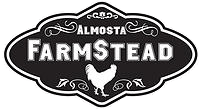


Dairy Goat Nutrition
Ideal food is a mixture of brush, vines, undergrowth, and bushes.
Giving your goat the best hay and grain, a balanced mineral mix offered free choice, sodium bicarbonate (baking soda) free choice, and clean fresh water will ensure you have given your dairy goat all it needs to thrive while giving you the best milk her genetics can provide as well as a long and happy life.


Almosta Farmstead
Goats
We adore goats...BUT...Are you ready for a dairy goat?
First, Let's Debunk A Few Common Goat Myths:
-
Goats do not eat everything. They will not eat your mower, your furniture, or your garbage. They may chew on the bark of a tree and will eat the fruit that falls off, they might also eat the leaves off your fruit tree. They nibble on little bits of this and little bits of that, but that’s about it. They will also not always eat all the weeds in your yard. They can be very selective about what they choose to eat.
-
Female goats (or DOES) are not generally mean and won’t usually try to head butt you or bite. Male goats that are castrated (WETHERS) are nice too. Male goats that are intact (BUCKS) can be aggressive and bite and/or head butt. But there are some nice ones, in fact, the more a buck is handled the easier he will be to handle.
-
Goats pay for and take care of themselves. Well, this isn't exactly true. There are many cost associated with owning a goat. Goats need proper housing, nutrition, exercise, and hoof care. They take a great deal of work and cost money to own and raise. Let's just say that you will have the joy of learning about your animal and knowing where your milk comes from. If you're lucky, perhaps the milk and babies will contribute to some of your expense in raising a goat.
All Ready for Dairy Goat Ownership?
Well, it’s all been decided. You’ve done your research and you’ve come to the conclusion that you and your family are ready for the adventurous commitment of owning a dairy goat. Thoughts of fresh wholesome milk fills your head with wonderful ideas. Why, just think of all of the dairy products you won’t have to buy anymore! Milk, butter, cheese, yogurt. The list goes on and on...
Well, hold on to your horses (or goats) for a second. There is a little more to this than you might think.
Some things to remember, the care and diet of a dairy goat determines their quality of milk. Their genetics determine the volume of production they are capable of.
What is the Does Temperament?
Consider the goat’s temperament. Does she like people? How does she handled? You might be asking yourself how important these questions are? Well, think about it this way. You will be handling your goat every day, at least two times a day. Milking her, leading her, washing her udder, trimming her feet, holding her for the vet, the list goes on and on…pick a doe who won't make you wish you'd left goat ownership to someone else.
Do you have a facility and fencing system in place?
Please look into proper facilities and fencing requirements prior to bringing your goat home. NEVER bring home an animal before you have everything ready for them. The number one killer of domestic goats is dogs. Not feral/wild dogs or coyotes, but your neighbor’s pet who was out gallivanting across the neighborhood. Thinking your neighbors are different and that they are all responsible dog owners is a delusion that will soon get your newly acquired dairy goat killed at worst and severely maimed at best. Wild dogs and coyotes are big issues, they really are, but your neighbor's dog can be the biggest threat. When you are designing your goat enclosure, (and we all have probably heard about how persistent and successful goats are at getting out of fences), your MAIN concern when building goat fences is not keeping the goats in, but keeping dogs out.
Goat structures don’t have to be fancy. Goats need a place to get out of the weather. It needs to be easy to clean, stay dry in the wet months of the year, have good air flow, provide shade in hot weather, and be secure from predators. Your climate will determine these needs. Note: Baby goats need more shelter than adults from the wind and cold, but ALL goats require shelter.
Find help!
Look for a vet in advance. Goats can die quickly under inexperienced care. Think about finding a vet before emergencies happen. If finding a vet isn't possible (many areas just don’t have large animal veterinarians), the next best thing is a mentor. This might be the person you buy your dairy goat from, or some other individual who has been in dairy goats for an extended period of time. Someone to advise you, give you ideas, and support you through the new owner jitters. You’ll start to feel more confident once you get your goat through the heat of summer, successfully bred in the fall, safely through the winter and pregnancy, and into a successful kidding in early Spring with milk flowing, and baby goats jumping everywhere making you laugh with their silliness. Be proactive and don't wait until too late. Know your goat ailments and where and how to test for them.
If you've done your research, are ready for work, found a mentor, have all your fences and structures in place, and have picked a doe with a great temperament - here is to great success and happiness in your new goat adventure!
